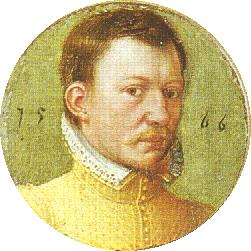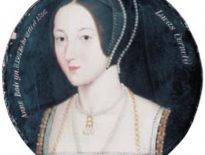On this day in Tudor history, 13th April 1534, Sir Thomas More got into a spot of bother, or rather a lot of bother, when he refused to swear his allegiance to the Act of Succession. This act of defiance, or rather of his conscience, would, of course, lead to More's execution in 1535.
You can find out more about the First Act of Succession (1534) and what the oath was all about in Claire's detailed article at https://www.theanneboleynfiles.com/the-first-act-of-succession-23-march-1534/
You can read the letter he wrote top his daughter, Meg Roper, in full at https://www.theanneboleynfiles.com/17-april-1534-thomas-more-sent-to-the-tower-of-london/
Also on this day in history:
- 1557 – Death of John Brydges, 1st Baron Chandos of Sudeley, landowner, soldier and Lieutenant of the Tower of London. He died at Sudeley Castle. When Lady Jane Grey was in the Tower, she gave him her English prayer book in which she wrote a homily for him, and when Elizabeth was in the Tower, he was accused of being too lenient with her.
- 1598 – Henry IV of France issued the Edict of Nantes granting the Huguenots freedom of religion in France.
- 1606 – Death of Richard Day, Church of England clergyman, printer and son of the famous printer John Day, who had printed John Foxe's “Actes and Monuments”. In 1578 Richard printed his own translation of “Christ Jesus Triumphant” by Foxe, and then got into trouble with his father when he started printing his father's works without his permission. His father had his printing equipment and stock seized, and Richard was forced to become a clergyman, becoming Vicar of Mundon, Essex.
- 1630 – Death of Anne Howard (née Dacre), Countess of Arundel, at Shifnal. She was laid to rest in the Fitzalan Chapel of Arundel Castle. Anne was the eldest daughter of Thomas Dacre, 4th Lord Dacre of Gilsand, and wife of Philip Howard, 13th Earl of Arundel. Anne was a staunch Catholic and harboured priests.



In 1534? So he was in the tower for over a year before his trial and execution? Why did it take so long? Michelle t
When he was first arrested his offence wasn’t yet treason, but once the Act of Treason was passed it became treason. However, Henry still hoped to persuade Thomas More and John Fisher to sign the oath and actually tried to persuade him on several occasions by sending Cromwell and Rich or Audley and other Lords, even his family, who took the oath to the King, were sent to him. His prison conditions were moderate but fairly well appointed at first and he had writing material and books, but the conditions got worse. Henry was anxious to know his reasons and More didn’t actually refuse, he didn’t actually say no. He refused to give an opinion and he was officially silent but he persuaded others to speak out and his writing was taken as being against the marriage. Henry was hesitant for a long time, but he had another reason, if More gave in, others would follow. Thomas More was a figure of international fame and renowned as a scholar and his works were famous throughout England and Europe. He had a great deal of influence and was held in high esteem by most people. Henry knew that if Thomas More accepted that there was a good chance others would follow suit because he was a man of the law, as well as a Catholic super hero and if he said the Act wasn’t a problem, more people would presumably agree. The same is true with Thomas More refusing, because if he believed that there was something wrong with these Acts, then there must be. Henry must have been hoping he could turn More, but at the same time he chose to allow his prosecution, rigged his trial and consented to the execution of a good friend and mentor. It took so long because of legal considerations and a lost hope to turn a man whose opinion mattered to his cause. More couldn’t in all consciousness abandon his impeccable beliefs and it was now treason to deny the King’s Royal Title’s, that is the Royal Supremacy.